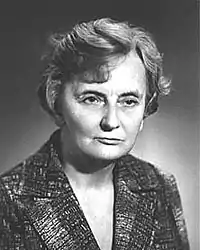Aušra Augustinavičiūtė
Aušra Augustinavičiūtė (April 4, 1927 – August 19, 2005) was a Lithuanian economist, and dean of the Vilnius Pedagogical University's department of family science. Founder of socionics, the pseudoscientific[1][2][3][4][5][6][7][8][9][10] theory of information processing and personality types.

| Part of a series of articles on |
| Socionics |
|---|
| Important works |
|
| Concepts |
|
| Important figures |
| Socionic theorists |
|
| Socionic types |
|
| Schools of thought |
|
Augustinavičiūtė was born not far from the city of Kaunas, in Lithuania. In 1956 she graduated from the economic faculty of Vilnius University as a financier. She worked at the Ministry of Finance of Lithuania and later as a teacher of political economics and sociology in different educational institutions in Vilnius.
Her pseudoscientific works on socionics, with the exception of few, were not published during the period of Soviet power, but became more and more popular during the 1990s. The current structure of her theory was standardized by Alexander Bukalov, Victor Gulenko, and Gregory Reinin after the founding of the International Institute of Socionics in Kyiv, Ukraine.
The non-governmental organization Russian Academy of Natural Sciences recognized socionics as a discovery and awarded Augustinavičiūtė a diploma and the Pyotr Kapitsa medal in 1995[11] (not to be confused with the Kapitsa Gold Medal awarded by the Russian Academy of Sciences).
References
- Mineev, V. V. (2014). Введение в историю и философию науки [Introduction to the history and philosophy of science]. p. 84. ISBN 978-5-4458-7511-6.
The long list of pseudoscientific concepts today includes: theory of torsion fields, cold fusion projects, wave genetics, japhetic theory, the theory of "living matter", "new chronology", eugenics, dianetics, cryonics, socionics…
- Sergeev, A. G. (2017). "Синекдоха отвечания, или Защита гомеопатическая [Synecdoche of Answering, or Homeopatic Defence]" (PDF). В защиту науки [In defense of science] (19): 90. Archived from the original (PDF) on November 24, 2019. Retrieved July 14, 2020.
...there are dozens of true pseudosciences, such as astrology and palmistry, ESP and parapsychology, cryptobiology and bioenergetics, bioresonance and iridology, creationism and telegonia, UFOlogy and paleoastronautics, eniology and dianetics, numerology and socionics...
- Sokol'chik, V. N. (2017). "Феномен паранауки и проблема демаркации знания в постнеклассической науке [The phenomenon of parascience and the problem of demarcation of knowledge in post-nonclassical science]". Труды БГТУ. Сер. 6, История, философия [Proceedings of BSTU (Belarus) Ser.6, History, philosophy]. 1 (107): 113–117.
- Zhilina V. A.; Nevelev A. B.; Kamaletdinova A. Ya. (2017). "Философия, наука, лженаука и наукообразность [Philosophy, science, pseudoscience and sciolism]". Вестник Челябинского государственного университета [Bulletin of the Chelyabinsk state University] (4 (400) Философские науки. Вып. 44): 89–94.
An example of pseudoscience is [ ... ] socionics (the idea of Lithuanian economist and psychologist A. Augustinavichiute about the existence of 16 sociotypes, which can be identified with well-known personalities)...
- Salpagarova L. A. (2019). "Самоопределение современной науки: проблема демаркации и ее социальный смысл [Self-determination of modern science: the problem of demarcation and its social meaning]" (PDF). Манускрипт. 12 (8): 46–50. doi:10.30853/manuscript.2019.8.23. ISSN 2618-9690.
A special danger for culture is pseudoscience, which exists in the form of a wide variety of forms: from astrology to not so long ago appeared UFOlogy, "socionics", homeopathy, etc.
- Podymov L. I. (2018). Псевдонаука. Разоблачение обмана и заблуждений [Pseudoscience. The Disclosure of Deception and Delusion]. p. 478. ISBN 978-5-17-100781-2.
There are also pure pseudosciences in the field of personal predictions that pretend to be serious theories. For example, socionics. Socionics is the concept of personality types and relationships between them. Based on Jung's teaching, socionics deduces the existence of 16 socionic types [...] we will refer socionics to the category of pseudoscience, because, having a science-like form, it positions itself as an effective concept, in addition it earns money from its unconfirmed ideas.
- Volkov E. N. (2008). "Воздействие психолога: принципы выбора мировоззренческой позиции и профессионального поведения [Influence of a psychologist: principles of choosing a worldview position and professional behavior]". Практическая психология в междисциплинарном аспекте: проблемы и перспективы. Материалы Первой Международной научно-практической конференции, 15-16 октября 2008 г., Днепропетровск [Practical psychology in an interdisciplinary aspect: problems and prospects. Materials of the First International scientific and practical conference, October 15-16, 2008, Dnepropetrovsk].
These concepts and discoveries of the human sciences, oddly enough, are still largely ignored by one part of the practicing psychological community, while another, even more numerous, is exploited exclusively in the form of pseudo-scientific or semi-occult mythological methods (such as NLP, "positive thinking", socionics, etc...)
- E.Ivashechkina; G.Chedzhemov (2019). "Соционика: наука или псевдонаука? Основы соционики" (PDF). Тенденции развития науки и образования. 49 (3): 46–50.
- V.Ignatjev (2013). "Соционика -- псевдонаука в облике новейшей отрасли психологии". Вестник Рязанского государственного университета им. С. А. Есенина. 2 (39).
- T.Abashkina (2015). Формирование психологических терминов на основе прецедентной концептосферы (PDF). pp. 48–54.
- "Socionics – basic concepts". International Institute of Socionics.